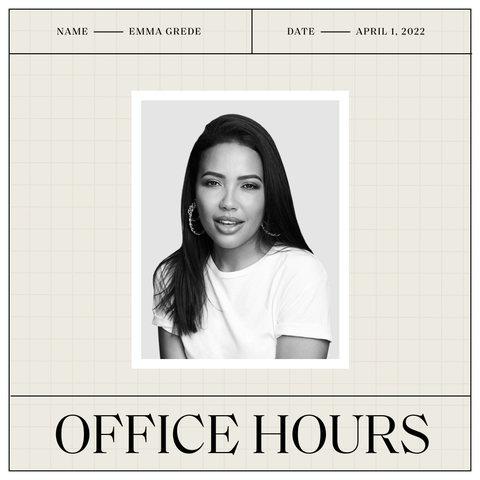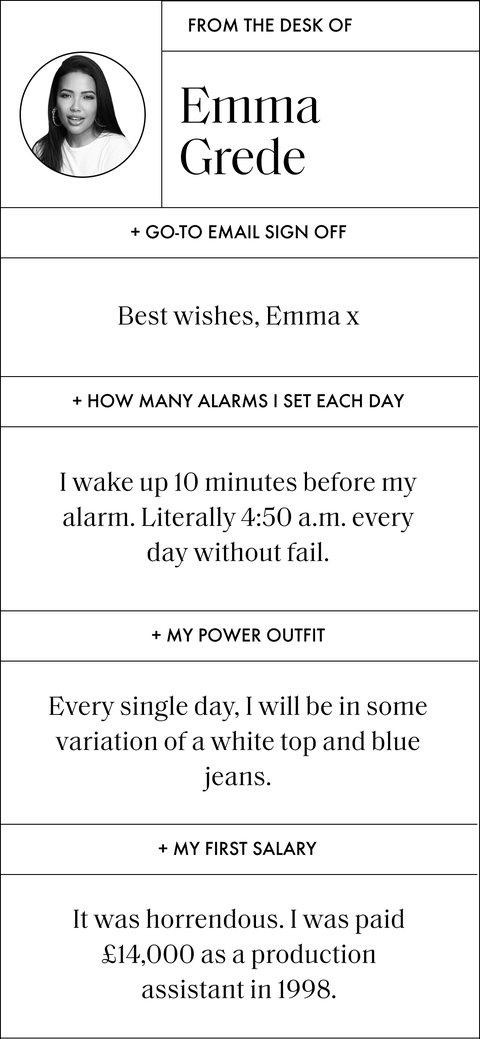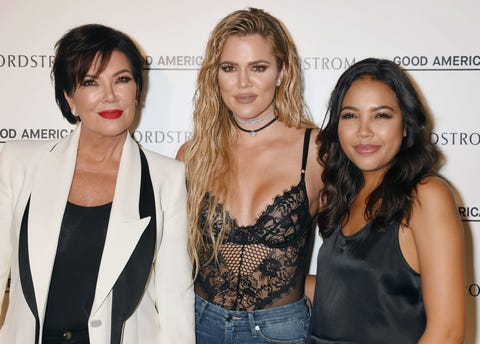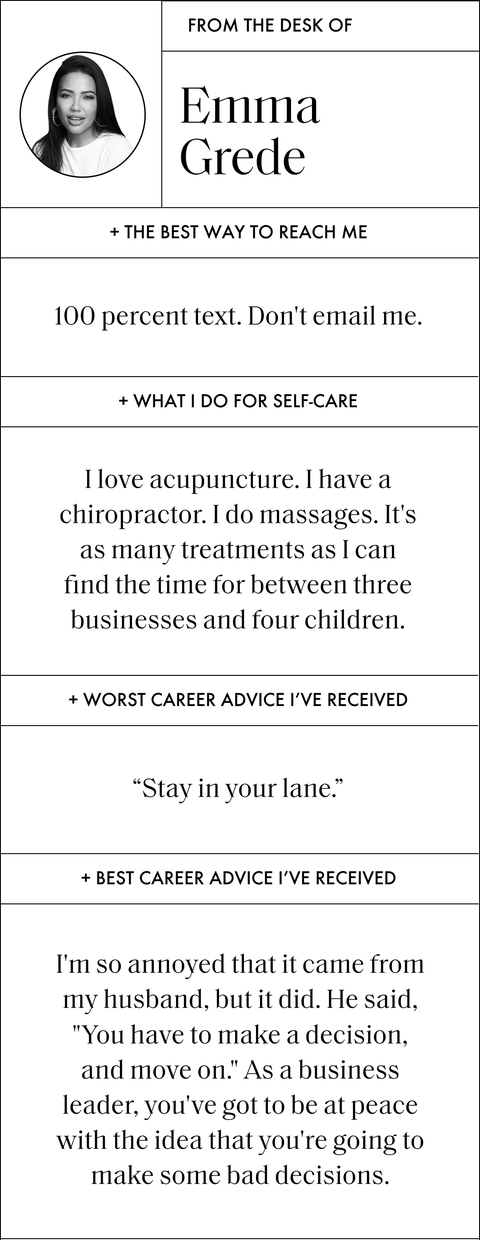In ELLE.com’s monthly series Office Hours, we ask people in powerful positions to take us through their first jobs, worst jobs, and everything in between. This month, we spoke with Emma Grede, the East London-born entrepreneur behind some of the Kardashian’s most successful ventures. She’s the co-founder and CEO of Good American alongside Khloé Kardashian, a brand that’s been heralded for its uncompromising approach to size inclusivity; a founding partner of Kim Kardashian’s Skims; and the co-founder of Kris Jenner’s cleaning line Safely. Grede’s also leveraged her expertise as the chairwoman of the Fifteen Percent Pledge, which aims to get retailers to fill 15 percent of their shelves with Black-owned businesses, and as the first Black female investor to ever be featured on Shark Tank. “I’m so fortunate to be at this point in my career where mentoring and investing in other women, especially female founders, is my way of helping to level the playing field,” she tells ELLE.com. Below, the multi-hyphenate reflects on her career thus far, including the worst advice she’s ever received and the mom-approved reason she doesn’t have imposter syndrome.
My first job
My first, first job was a paper route. I actually credit that job for my love of the mornings, because you would get up at 4:30 a.m., and you’d be delivering papers at 5 a.m. There was just this amazing quiet moment where you could really get your shit together, and I would think about what I had going on. That’s the same way I start my day now.
How I first made money
In the beginning of my career, I did a lot of different jobs. All I wanted to do was be backstage at fashion shows, and that wasn’t a job anyone was paying me for back then. So I supplemented. I worked at a deli. I worked in a clothing shop. I was a personal shopper. I was a waitress. I did the full gambit. I can’t say I smelled that great coming out of the deli, but I can take pleasure in anything, and I think that’s one of the things that actually serves me really well in my life. I learned the name of every single olive and every piece of cheese in existence. That’s handy for me now as I’m putting together charcuterie boards in my old age.
Why I wasn’t scared to start my own marketing agency at age 26
I credit my naïveté with giving me the chutzpah to just do things. I had no context of the hierarchy of the big agencies in Hollywood, so I would try to get Bryan Lourd on the phone to talk about a commercial deal for some Z-list actress. In a way, that was a great thing. I also didn’t have the ego. I would bring people into my company and pay them more than I was paying myself, because I was so focused on growing the business. I was like, I’m creating a company. It’s going to be bigger than me. That mentality was really, really fortunate. But I wasn’t scared. I don’t have imposter syndrome. When I was younger, my mother taught me that you’re not better than anyone else, nor is anybody better than you. That principle really stayed with me.
What I’ve learned from Kim, Kris, and Khloé
They’re all incredible at understanding an audience. They have been famous and doing this for a really, really long time, but they’ve never lost touch with a certain type of girl, a regular girl. That’s from pricing—how much do people want to pay for things—to our audience and marketing. They are very in touch with regular women in this country wanting to feel great about themselves.
I call Kris about everything, business or not business. She’s a great source of knowledge. I moved here from England, and I didn’t know where to go. Kris gave me my doctor, my dentist, my kids’s school, the full lot. They’re super generous with their time, and I think that’s another really big thing in business. When I need Kris or Khloé or Kim, they’re there for me straightaway.
Why I built a brand rooted in diversity
I spent 10 years working in fashion before I started Good American. So much of that was working with brands to project an image of inclusivity or diversity, when in fact the product never stood up to that, and diversity was actually part of a short-term marketing fix. After a while, that really grates at you. As a Black female CEO, I was like, What if I just used my version of what I think is beautiful and the viewpoint that I’ve grown up with and projected that onto a business? What if the company was just diverse, because the person hiring has a different idea and expectation of what great looks like? If you have a bunch of people sitting around a table that all see things differently, that’s a superpower, and it also stops you from running into numerous mistakes. If you’re building a company where diversity is truly at the heart of it, you’re going to have a stronger business. Good American and Skims are the perfect examples of that, because we have grown enormously successful and profitable with that approach. And it’s not an accident.
The reason other businesses haven’t embraced size inclusivity yet
I don’t care what they say—the idea of it being cost prohibitive or eroding the bottom line—fashion still has a lot of snobbism around it. A lot of brands just don’t want that customer. They’re happy to have a curvy girl, but they don’t want a girl who’s a size 20 in the campaign. We have to be really honest about that snobbism. The large majority of women in this country are completely ignored by fashion. There’s also this other part of it being complex and technical to make clothes that actually fit, and a lack of knowledge about how to operate in the bigger sizes. That is a truism, and I think that’s changing. Brands like Good American and Skims have shown that not only is there a business case, but we are literally changing the face of fashion. We are training designers, fashion techs, planners, and merchants to really understand that side of the business.
How experiencing racism in America affected my approach to my career
Coming to this country was an awakening for me, because I didn’t grow up feeling like being Black was negative. When I got to America, I saw how people around me were treated, and it was overwhelming. That’s not to say there isn’t racism in Europe—there is. But coming here, there was this element of separation that I hadn’t experienced. It’s completely changed the focus of my energies and where I believe I can really be of service. I mean that beyond the professional terms, because ultimately, once you hit a certain level of success, there are only so many more pairs of jeans and knickers I can sell that makes me truly happy. At some point, you’re really thinking about, Well, what am I doing? Who else am I impacting? I’m a mom of four kids. What kind of world do I want them to grow up in? It’s one where equality is something that is happening, not something that we just talk a lot about.
This interview has been edited and condensed for clarity.
This content is created and maintained by a third party, and imported onto this page to help users provide their email addresses. You may be able to find more information about this and similar content at piano.io




